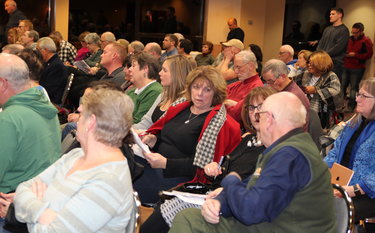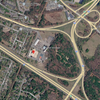Guilderland debates: Should time for public comment be prescribed?
Enterprise file photo — Elizabeth Floyd Mair
Many Guilderland residents in December 2018 raised concerns to the town’s planning board about a proposed senior living facility on Route 155 across from Farnsworth Middle School on what had been Hiawatha Trails golf course. The current town board is considering rules for meeting procedures and public conduct.
GUILDERLAND — The usual ebb and flow of ideas were exchanged between Guilderland Town Board members and residents who had come to the board’s June 21 meeting as the board had a lengthy and at times contentious discussion on adopting rules of procedures for public bodies.
Most of the tension centered around the proposed rule that a board chairperson “may announce rules that prescribe the time to be allotted to each speaker and the number of times each speaker may speak.”
That tenet is one of 11 rules proposed for meeting procedures. Another nine rules were proposed for public conduct. Both sets of rules would apply to the town board, zoning board, planning board, conservation advisory council, conservation easement review board, and traffic safety committee.
In the end, the town board postponed making a decision on the rules.
“Public speaking is difficult,” said resident Karen White from the lectern at the start of the discussion. White said that she, herself, dreads it.
With proposed development, some concerns aren’t immediately obvious to the public, White said. She gave the example of tractor-trailers pulling in “any hour day or night” to a building that could have been rotated to avoid having residential neighbors bothered by the noise.
“People have a lot of afterthoughts … that affect their quality of life …,” she said. “To limit residents’ ability to comment on any of these projects is wrong.”
“If you’re going to limit public comment, you better limit the applicants’ comments,” said Robyn Gray, a resident who chairs the Guilderland Coalition for Responsible Growth. She said some applicants “go on ad nauseum.”
She added, “I don’t think either one should be limited.”
Gray concluded, “Asking for civility is a far cry from asking for time limits.”
Councilwoman Rosemary Centi responded that she had been at meetings until midnight because groups would not designate a single speaker. Centi termed this “mind-numbing” and “unfair.”
“You lose focus,” Centi said, and citizens leave the meeting because they don’t see an end in sight.
She also noted that the proposed rules would allow for a majority vote by the board members to suspend the rules of order. “Every board has the ability to overrule the chair’s decision,” said Centi, calling it a system of checks and balances.
In her 23 years of government service in Guilderland, Centi said, there has never been a limit to discussion.
Supervisor Peter Barber noted that both the Guilderland School Board and the Albany County Legislature require members of the public to preregister to speak and limit the time each can speak.
Among neighboring municipalities, Altamont, a village within Guilderland, recently set a time limit for speakers. Neither Voorheesville nor New Scotland have a time limit although, in the midst of packed meetings during the time when a big-box mall was proposed in New Scotland, a time limit was set for speakers.
Barber said that during his tenure as supervisor and before that, during the 16 years he chaired the town’s zoning board, “never once” did he set a limit for speakers.
He noted, though, that state guidance allows for a time limit for speakers to be set.
The state’s Open Meetings Law requires that the public be able to attend meetings but does not require that members of the public be allowed to speak.
Barber also said that an applicant, not the public, has “the burden of proof.”
Councilwoman Amanda Beedle, who had served on the Guilderland Planning Board, said that, during a hearing on Pyramid’s proposal to build a Costco Wholesale store, a time limit was set so as many people as possible could be hard from.
Gray countered that Guilderland boards often want everything done in one night. If a hearing ran long, she said, it could be continued.
Resident Chuck Klaer said that limiting residents’ speaking time to three minutes each “before the meeting even starts is absurd.”
“What message do we want to send people? … Do we want to encourage people to speak?” asked Councilwoman Laurel Bohl.
Bohl asserted it would be difficult for a resident to say, in just three minutes, how a proposed project would affect their quality of life. “The large projects will have the most effect,” she said, stating that everyone has the right to speak.
Responding to the assertion that residents not allotted enough time to speak could put their comments in writing, Bohl said there is “nothing comparable” to speaking at a microphone and getting your point across to everyone in town.
Resident Gerd Beckmann asked, if a time limit were set, if one speaker could defer their allotted time to another.
After that happened at a Guilderland School Board meeting, where a resident who opposed mask requirements gave her allotted time to Jeff Thomas, a leader of the group, so he could speak more, the school board adopted a policy prohibiting that.
Donald Csaposs, the town’s grant writer, stressed he was speaking as “a private citizen.” Csaposs said he thought about reading for five minutes from Leviticus so that everyone would understand that five minutes is plenty of time to express a rational, formed opinion.
Csaposs said board chairs should “damn well” be given the opportunity to run meetings “without being babysat.”
He further said that, while town board members were being paid well to listen to the public, members of other boards in Guilderland have small stipends and should exercise their rights.
Bohl suggested circulating new language for the rules among the board members to which Barber responded she could run afoul of open government laws.
“Can I send it to you?” asked Bohl of Barber.
She went on to say eight residents had spoken against having a prescribed time. What matters, she said, is not what board members think but what residents want.
“Do we want people to have a free and open robust debate?” she asked.
Barber then asked why the new rules were needed and suggested jettisoning them. He had said earlier in the discussion, “This is a solution in search of a problem.”
Councilwoman Christine Napierski said she wanted to think about it, and Beedle asked what the planning and zoning boards had thought.
“They didn’t want to be hamstrung … they’re in favor of having discretion,” said Barber.
Public conduct
The other set of proposed rules, the public-conduct rules, drew no fire.
Those rules said the chairperson should assure decorum, that residents should speak from a designated lectern and address the chairperson rather than the audience.
The audience is not to shout, boo, clap hands, or otherwise create disruption. The use of profane, racial or ethnic slurs is prohibited, as is vulgar, inflammatory, threatening, or abusive language. The chairperson may remove anyone who violates the rules and call a police officer or suspend the meeting if need be.
The only rule in the public-conduct resolution that drew criticism was this one: “No signs, posters or other visual displays of any type are allowed in the boardroom by members of the public.”
Gray pointed out that this would preclude a resident from, say, coming to a meeting with a map that might help the board understand something about a proposed development.
Napierski said she agreed with that and that the proposed rule was meant to limit signs or displays of protest.
Beedle suggested wording that would make it clear that no signs or posters of protest would be allowed.
Other business
In other business at its June 21 meeting, the Guilderland Town Board:
— Authorized a request for proposals for consultants to help a committee of residents in updating the town’s 2001 comprehensive land-use plan. “While the Town Planner and other Town staff will provide services in support of the Committee, the selected Consultant will have the primary responsibility for the scope of work,” said the resolution.
Proposals are to include research on development patterns in Guilderland over the last 20 years, mapping of existing conditions, and a compilation of demographic and economic data. The proposal is also to include methods for encouraging public participation, such as meetings, surveys, and use of the town’s website and social media accounts.
“The Plan Update should articulate a shared community vision and desired future, define short-, medium-, and long-term goals and objectives, respond to a range issues, and provide a blueprint for accomplishing community objectives,” the resolution says;
— Scheduled a public hearing for July 12 at 7:15 p.m. on a proposed local law regarding budget, procurement, and purchasing provisions in the town code as requested by the comptroller’s office;
—Agreed to spend $6,500 in American Rescue Program Act funds to purchase an audience route/remote meeting integration system. Without the purchase, Barber said, a meeting couldn’t be taped and also broadcast.
“I think it’s money well spent,” said Beedle;
— Heard an update from Barber on sidewalk construction in town. Work on the sidewalk from Devonshire Drive along Route 20 to the Guilderland Public Library is slated to start on July 15 and could last several months, he said.
Work on the sidewalk to be built from Carman Road to Lynnwood Elementary School will start the first week in July, said Csaposs, adding, “If there are no supply issues, it’s a three week job”; and
— Heard a recommendation from Napierski that, in the future, the town extend its summer camp program to full-day, rather than the current half-day, to accommodate families with two working parents.
“Daycare for working parents is hard to find …,” said Napierski. “It’s very important the program be expanded.”
— Sean Mulkerrin provided information on speaking limits, or lack of, in Altamont, Voorheesville, and New Scotland.



